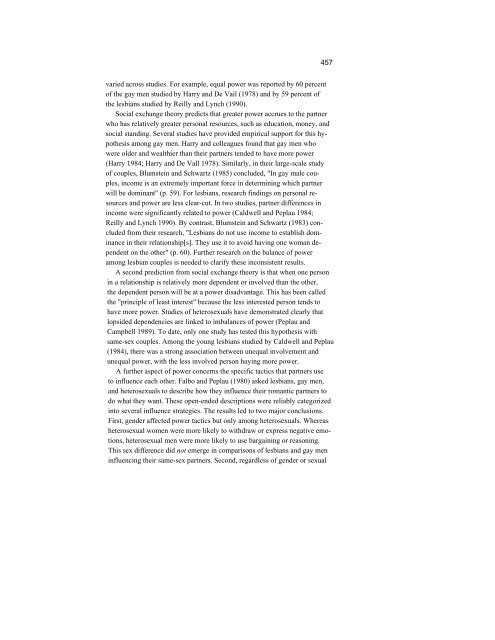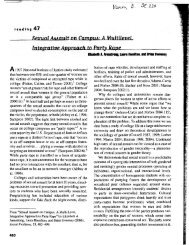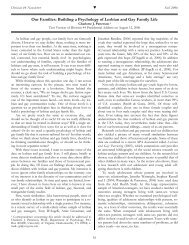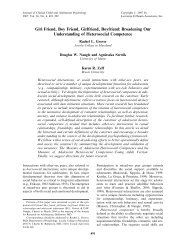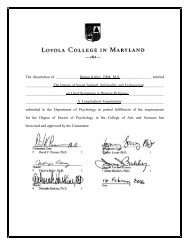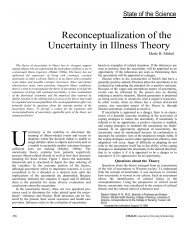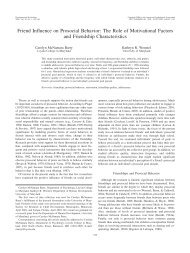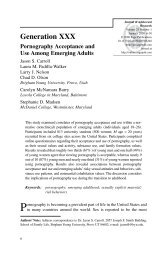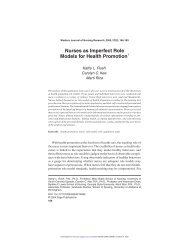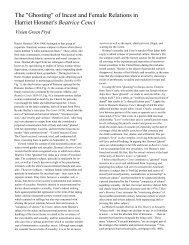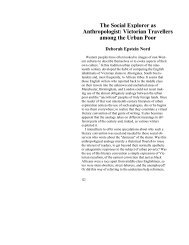17 The Close Relationships of Lesbians, Gay Men, and Bisexuals
17 The Close Relationships of Lesbians, Gay Men, and Bisexuals
17 The Close Relationships of Lesbians, Gay Men, and Bisexuals
Create successful ePaper yourself
Turn your PDF publications into a flip-book with our unique Google optimized e-Paper software.
457<br />
varied across studies. For example, equal power was reported by 60 percent<br />
<strong>of</strong> the gay men studied by Harry <strong>and</strong> De Vail (1978) <strong>and</strong> by 59 percent <strong>of</strong><br />
the lesbians studied by Reilly <strong>and</strong> Lynch (1990).<br />
Social exchange theory predicts that greater power accrues to the partner<br />
who has relatively greater personal resources, such as education, money, <strong>and</strong><br />
social st<strong>and</strong>ing. Several studies have provided empirical support for this hy-<br />
pothesis among gay men. Harry <strong>and</strong> colleagues found that gay men who<br />
were older <strong>and</strong> wealthier than their partners tended to have more power<br />
(Harry 1984; Harry <strong>and</strong> De Vall 1978). Similarly, in their large-scale study<br />
<strong>of</strong> couples, Blumstein <strong>and</strong> Schwartz (1985) concluded, "In gay male cou-<br />
ples, income is an extremely important force in determining which partner<br />
will be dominant" (p. 59). For lesbians, research findings on personal re-<br />
sources <strong>and</strong> power are less clear-cut. In two studies, partner differences in<br />
income were significantly related to power (Caldwell <strong>and</strong> Peplau 1984;<br />
Reilly <strong>and</strong> Lynch 1990). By contrast, Blumstein <strong>and</strong> Schwartz (1983) con-<br />
cluded from their research, "<strong>Lesbians</strong> do not use income to establish dom-<br />
inance in their relationship[s]. <strong>The</strong>y use it to avoid having one woman de-<br />
pendent on the other" (p. 60). Further research on the balance <strong>of</strong> power<br />
among lesbian couples is needed to clarify these inconsistent results.<br />
A second prediction from social exchange theory is that when one person<br />
in a relationship is relatively more dependent or involved than the other,<br />
the dependent person will be at a power disadvantage. This has been called<br />
the "principle <strong>of</strong> least interest" because the less interested person tends to<br />
have more power. Studies <strong>of</strong> heterosexuals have demonstrated clearly that<br />
lopsided dependencies are linked to imbalances <strong>of</strong> power (Peplau <strong>and</strong><br />
Campbell 1989). To date, only one study has tested this hypothesis with<br />
same-sex couples. Among the young lesbians studied by Caldwell <strong>and</strong> Peplau<br />
(1984), there was a strong association between unequal involvement <strong>and</strong><br />
unequal power, with the less involved person haying more power.<br />
A further aspect <strong>of</strong> power concerns the specific tactics that partners use<br />
to influence each other. Falbo <strong>and</strong> Peplau (1980) asked lesbians, gay men,<br />
<strong>and</strong> heterosexuals to describe how they influence their romantic partners to<br />
do what they want. <strong>The</strong>se open-ended descriptions were reliably categorized<br />
into several influence strategies. <strong>The</strong> results led to two major conclusions.<br />
First, gender affected power tactics but only among heterosexuals. Whereas<br />
heterosexual women were more likely to withdraw or express negative emo-<br />
tions, heterosexual men were more likely to use bargaining or reasoning.<br />
This sex difference did not emerge in comparisons <strong>of</strong> lesbians <strong>and</strong> gay men<br />
influencing their same-sex partners. Second, regardless <strong>of</strong> gender or sexual


